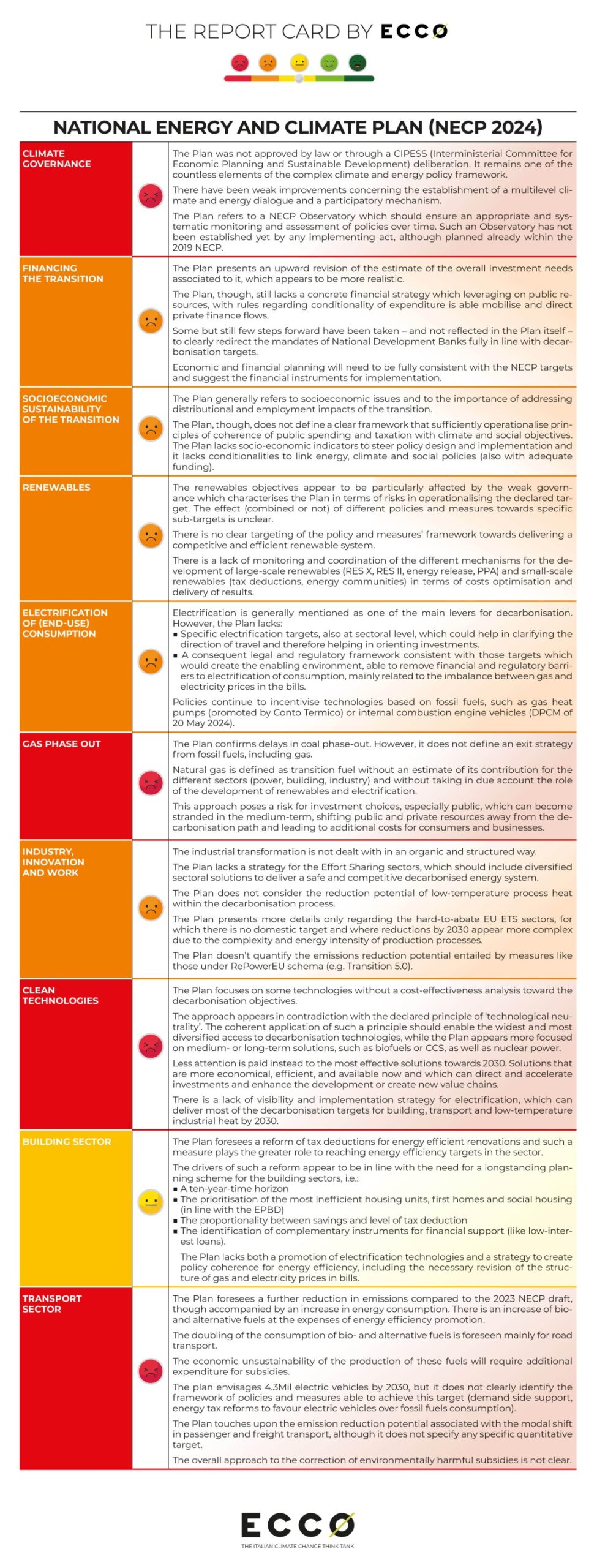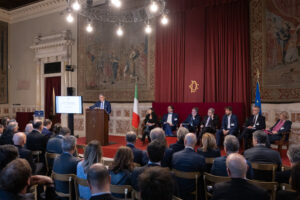
The National Energy and Climate Plan (NECP) plays a central role in achieving the European Union’s climate targets (Fit for 55) and delivering Italy’s contribution to the Paris Agreement. Moreover, Italy’s Plan holds significant importance since, unlike many other EU Member States, the country lacks a Climate Law and thus it does not have a climate governance framework at national level.
The agreement to undertake the first Global Stocktake at COP28, in Dubai, set the course that needs to be followed in the coming years. In this sense, the Nationally Determined Contributions (NDCs) – that will need to be revised and submitted by February 2025, before COP30 by the 195 Parties to the Paris Agreement – will have to take into account the need to “transition away from fossil fuels in energy systems”, as outlined in the agreement signed at COP28. The NECP, which sets climate and energy targets for 2030, represents the starting point for Italy’s contribution. Last April, at the G7 Ministerial Meeting on Climate, under the Italian Presidency, Ministers reached a new agreement to implement the results of COP28 at national level. In addition to the commitment to adopt “domestic plans, policies and actions for transitioning away from fossil fuels, including intensive efforts to reduce demand for and use of fossil fuels”, the G7 reaffirmed commitment to triple renewable capacity, double energy efficiency, increase global energy storage by more than six-fold, significantly increase grid investments, complete the decarbonisation of the electricity sector by 2035, prioritise electricity as a ‘key technology‘ for transport decarbonisation, and phase out inefficient fossil subsidies by next year. Nevertheless, little or none of these commitments are reflected in the NECP.
Italy’s draft updated NECP, published in June 2023, revealed a ‘realistic’ approach. Instead, the final version of Italy’s NECP, which was submitted to the EU Commission on the 1st of July 2024, does not retain much of that principle and the desired concreteness. The Plan shows contradictions concerning climate and energy goals both in its structure, regulations and decrees that should have begun to contribute to its implementation in the past year.
Italy’s Plan was submitted to the European Commission on time, along with that of a few other countries, showing a political will on Italy’s part to fulfil its obligations. However, this willingness is not reflected in the Plan implementation nor in any other element that could make it concrete.
The final version of the Plan sent by Italy:
- Lacks legal force and a coherent implementation framework. Dedicated resources and policy impact assessments are unclear.
- Lacks a vision of the country’s energy transition and economic transformation pathway, as it does not identify neither strategies for moving away from fossil fuels, as per COP28 commitments, nor ” domestic plans, policies and actions for transitioning away from fossil fuels“, as agreed at the G7 Climate Ministerial.
- The ambition on renewables is not supported by the development of a coherent policy framework. This leads to risks of uncompetitive electricity prices for manufacturing and for the country.
- Electrification is not identified as a lever for decarbonisation. The regulatory framework remains inconsistent. It considers solutions that are not aligned with the targets and those that are more efficient in terms of energy and emissions as equivalent – e.g. by supporting gas heat pumps and endothermic engines in the transport sector.
- There is a lack of an organic vision of the industrial transformation in the decarbonisation. A vision that can build the foundations for competing in the new international markets by framing industrial development within the net zero perspective adopted by Europe, the United States and China, starting with diversified strategies that focus on available technologies and their potential by setting the path for solutions that are not yet mature or economic.
- There is no plan to ensure social sustainability in the face of major technological and market changes that will affect people and businesses.In spite of the great gas price crisis of 2022-2023 and in the face of technological innovation that, if unmanaged, can bring about strong socio-economic impacts, the NECP does not offer the necessary safeguards and alternative opportunities to lead the various social groups from an economy based on fossil fuels.
According to the Plan’s estimates, Italy will miss its emission targets by about 100MtCO2eq cumulatively between 2021-2030, which, based on some of the most recent projections of CO2 costs, equates to about €15 billion over this period. An expense that will weigh heavily on public finances, in an already heavily indebted country with limited fiscal space. These resources, instead, could have been used to direct policies towards coherence of public spending and taxation with energy and climate goals, with the intent to safeguarding business competitiveness, in a context where clean-tech supply chains are positioned at the top in global economies.
During the last public consultation, we identified 10 essential elements to achieve an economical transformation able to reach climate objectives and capable of seizing strategic opportunities for the national economy.
Now that the Plan is finalised, our work will focus both on the necessity to monitor its implementation and on opportunities to improve policies alignment with decarbonisation targets. The monitoring will take place at two key moments: the presentation of the Economic and Financial Document (DEF) and the Budget Law. It will also include an assessment of the alignment of public policies with climate and 2030 and 2050 targets.
Within this process, legislative and regulatory production will be monitored. As a consequence, it will be possible to:
- Whether and how energy standards and regulations are consistent with targets for increasing the share of renewables in the electricity system
- Whether the revision of the super/eco bonus succeeds in reconciling energy efficiency, emission reduction, and social sustainability of the building transition
- Whether taxation is moving towards consistency with climate targets and addressing their contradictions.






